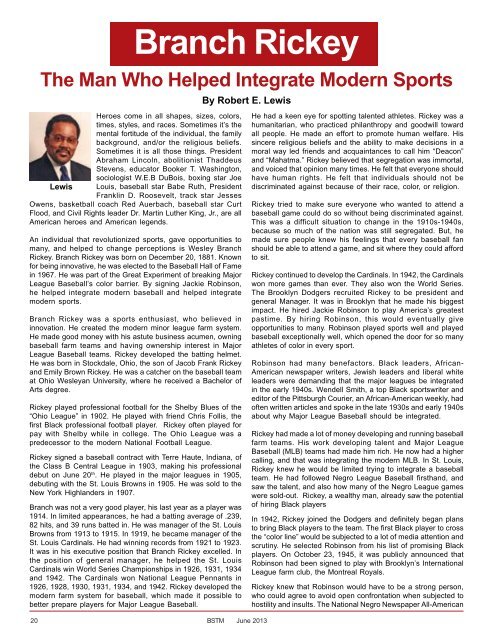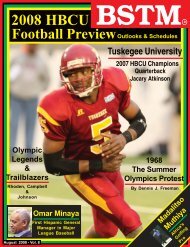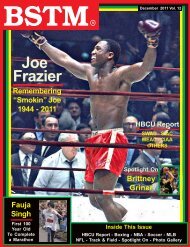June 2013 - Black Sports The Magazine
June 2013 - Black Sports The Magazine
June 2013 - Black Sports The Magazine
Create successful ePaper yourself
Turn your PDF publications into a flip-book with our unique Google optimized e-Paper software.
Branch Rickey<br />
<strong>The</strong> Man Who Helped Integrate Modern <strong>Sports</strong><br />
Heroes come in all shapes, sizes, colors,<br />
times, styles, and races. Sometimes it’s the<br />
mental fortitude of the individual, the family<br />
background, and/or the religious beliefs.<br />
Sometimes it is all those things. President<br />
Abraham Lincoln, abolitionist Thaddeus<br />
Stevens, educator Booker T. Washington,<br />
sociologist W.E.B DuBois, boxing star Joe<br />
Lewis Louis, baseball star Babe Ruth, President<br />
Franklin D. Roosevelt, track star Jesses<br />
Owens, basketball coach Red Auerbach, baseball star Curt<br />
Flood, and Civil Rights leader Dr. Martin Luther King, Jr., are all<br />
American heroes and American legends.<br />
An individual that revolutionized sports, gave opportunities to<br />
many, and helped to change perceptions is Wesley Branch<br />
Rickey. Branch Rickey was born on December 20, 1881. Known<br />
for being innovative, he was elected to the Baseball Hall of Fame<br />
in 1967. He was part of the Great Experiment of breaking Major<br />
League Baseball’s color barrier. By signing Jackie Robinson,<br />
he helped integrate modern baseball and helped integrate<br />
modern sports.<br />
Branch Rickey was a sports enthusiast, who believed in<br />
innovation. He created the modern minor league farm system.<br />
He made good money with his astute business acumen, owning<br />
baseball farm teams and having ownership interest in Major<br />
League Baseball teams. Rickey developed the batting helmet.<br />
He was born in Stockdale, Ohio, the son of Jacob Frank Rickey<br />
and Emily Brown Rickey. He was a catcher on the baseball team<br />
at Ohio Wesleyan University, where he received a Bachelor of<br />
Arts degree.<br />
Rickey played professional football for the Shelby Blues of the<br />
“Ohio League” in 1902. He played with friend Chris Follis, the<br />
first <strong>Black</strong> professional football player. Rickey often played for<br />
pay with Shelby while in college. <strong>The</strong> Ohio League was a<br />
predecessor to the modern National Football League.<br />
Rickey signed a baseball contract with Terre Haute, Indiana, of<br />
the Class B Central League in 1903, making his professional<br />
debut on <strong>June</strong> 20 th . He played in the major leagues in 1905,<br />
debuting with the St. Louis Browns in 1905. He was sold to the<br />
New York Highlanders in 1907.<br />
Branch was not a very good player, his last year as a player was<br />
1914. In limited appearances, he had a batting average of .239,<br />
82 hits, and 39 runs batted in. He was manager of the St. Louis<br />
Browns from 1913 to 1915. In 1919, he became manager of the<br />
St. Louis Cardinals. He had winning records from 1921 to 1923.<br />
It was in his executive position that Branch Rickey excelled. In<br />
the position of general manager, he helped the St. Louis<br />
Cardinals win World Series Championships in 1926, 1931, 1934<br />
and 1942. <strong>The</strong> Cardinals won National League Pennants in<br />
1926, 1928, 1930, 1931, 1934, and 1942. Rickey developed the<br />
modern farm system for baseball, which made it possible to<br />
better prepare players for Major League Baseball.<br />
By Robert E. Lewis<br />
20 BSTM <strong>June</strong> <strong>2013</strong><br />
He had a keen eye for spotting talented athletes. Rickey was a<br />
humanitarian, who practiced philanthropy and goodwill toward<br />
all people. He made an effort to promote human welfare. His<br />
sincere religious beliefs and the ability to make decisions in a<br />
moral way led friends and acquaintances to call him “Deacon”<br />
and “Mahatma.” Rickey believed that segregation was immortal,<br />
and voiced that opinion many times. He felt that everyone should<br />
have human rights. He felt that individuals should not be<br />
discriminated against because of their race, color, or religion.<br />
Rickey tried to make sure everyone who wanted to attend a<br />
baseball game could do so without being discriminated against.<br />
This was a difficult situation to change in the 1910s-1940s,<br />
because so much of the nation was still segregated. But, he<br />
made sure people knew his feelings that every baseball fan<br />
should be able to attend a game, and sit where they could afford<br />
to sit.<br />
Rickey continued to develop the Cardinals. In 1942, the Cardinals<br />
won more games than ever. <strong>The</strong>y also won the World Series.<br />
<strong>The</strong> Brooklyn Dodgers recruited Rickey to be president and<br />
general Manager. It was in Brooklyn that he made his biggest<br />
impact. He hired Jackie Robinson to play America’s greatest<br />
pastime. By hiring Robinson, this would eventually give<br />
opportunities to many. Robinson played sports well and played<br />
baseball exceptionally well, which opened the door for so many<br />
athletes of color in every sport.<br />
Robinson had many benefactors. <strong>Black</strong> leaders, African-<br />
American newspaper writers, Jewish leaders and liberal white<br />
leaders were demanding that the major leagues be integrated<br />
in the early 1940s. Wendell Smith, a top <strong>Black</strong> sportswriter and<br />
editor of the Pittsburgh Courier, an African-American weekly, had<br />
often written articles and spoke in the late 1930s and early 1940s<br />
about why Major League Baseball should be integrated.<br />
Rickey had made a lot of money developing and running baseball<br />
farm teams. His work developing talent and Major League<br />
Baseball (MLB) teams had made him rich. He now had a higher<br />
calling, and that was integrating the modern MLB. In St. Louis,<br />
Rickey knew he would be limited trying to integrate a baseball<br />
team. He had followed Negro League Baseball firsthand, and<br />
saw the talent, and also how many of the Negro League games<br />
were sold-out. Rickey, a wealthy man, already saw the potential<br />
of hiring <strong>Black</strong> players<br />
In 1942, Rickey joined the Dodgers and definitely began plans<br />
to bring <strong>Black</strong> players to the team. <strong>The</strong> first <strong>Black</strong> player to cross<br />
the “color line” would be subjected to a lot of media attention and<br />
scrutiny. He selected Robinson from his list of promising <strong>Black</strong><br />
players. On October 23, 1945, it was publicly announced that<br />
Robinson had been signed to play with Brooklyn’s International<br />
League farm club, the Montreal Royals.<br />
Rickey knew that Robinson would have to be a strong person,<br />
who could agree to avoid open confrontation when subjected to<br />
hostility and insults. <strong>The</strong> National Negro Newspaper All-American












